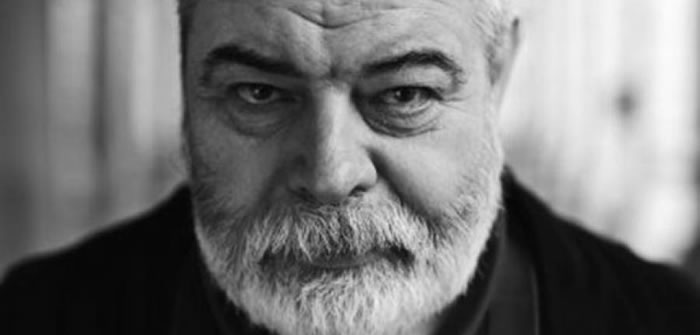Celebrating the fifth year of his ambitious Medias Central European Film Festival (MECEFF), Romanian filmmaker Radu Gabrea has announced this year’s edition will be examining “one of the most profound influences on the culture of the 20th century” — World War I and its cinematic legacy.
Set to unspool from August 30-September 6 in the Transylvanian town of Medias,
MECEFF curates its non-competition films around a central theme that changes each year, an approach that sets it apart from similar competitive European niche fests.
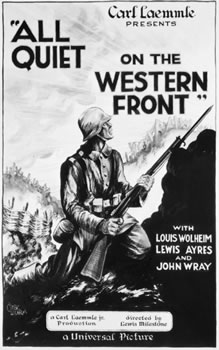 With 2014 marking the 100th anniversary of the start of “the Great War,” and future global commemorations of the war planned through 2019, Gabrea’s theme this year is perhaps the festival’s most timely yet.
With 2014 marking the 100th anniversary of the start of “the Great War,” and future global commemorations of the war planned through 2019, Gabrea’s theme this year is perhaps the festival’s most timely yet.
“World War I was a phenomenon that had a huge impact on every aspect of the past century and we’re going to examine it in an entirely new light,” Gabrea said in a Skype interview this week from his home outside of Bucharest. “It was also hugely important artistically. Everything that happened after it – the Weimar Republic, German Expressionism and so many masterpieces of the cinema – all were indebted to this earthquake of history.”
“And many of the directors who created those masterpieces were intimately involved in the war, some even fighting on the front.”
Gabrea said he would invite war historians, film critics and journalists to Medias this year to host seminars and discussions 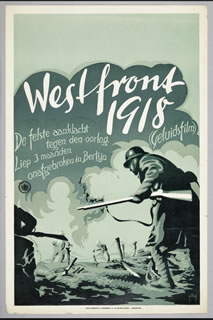 during the 6-day event.
during the 6-day event.
“Unlike World War II, which was a war of clear and stark morality – the good guys vs. bad guys – World War I was a war of pure aggrandizement,” he said. “Historians, notably French historians, have been re-examining the War not from the usual celebratory approach that’s been taken in the past – all the usual patriotic lying. We are now seeing that all those millions of people died almost for nothing.”
Gabrea, who has a doctorate from Catholic University in Belgium and was a professor during the 1970s, noted that Romanian soldiers, most of them peasants, suffered enormously during the war. “Don’t forget, the war started seven years after the big peasant uprising, when 10,000 of the country’s poorest were killed by the Romanian army. In spite of this, Romanian peasants still fought in World War I for this country, many of them attacking the German soldiers barefoot.”
 MECEFF’s WWI emphasis is echoed by the Romanian Cultural Institute’s (ICR) own year-long programming of Great War-themed symposia and events. The Institute is a government-funded institution that promotes Romanian culture in Romania and abroad, and it lends some financial support to MECEFF. ICR has had a long and close association with Gabrea, and last October honored him in New York with a two-day retrospective of his career.
MECEFF’s WWI emphasis is echoed by the Romanian Cultural Institute’s (ICR) own year-long programming of Great War-themed symposia and events. The Institute is a government-funded institution that promotes Romanian culture in Romania and abroad, and it lends some financial support to MECEFF. ICR has had a long and close association with Gabrea, and last October honored him in New York with a two-day retrospective of his career.
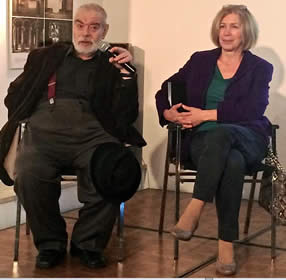
ICR’s “Radu Gabrea Retrospective” screened 10 of the director’s best-known feature films at the Institute’s auditorium in New York City and at the Tribeca Screening Room. Included were two of Gabrea’s most recent films, “Lindenfeld” and “Three Days Before Christmas,” starring his wife and co-director of MECEFF, actress Victoria Cocias, as well as “Beyond the Sands”, “Red Glove,” “Goldfaden’s Legacy,” “The Beheaded Rooster,” “Jews for Sale,” “Gruber’s Journey,” “A Man Called Eve” and “Rumenye, Rumenye.”
“For me it was incredible,” Gabrea said. “Some people stayed straight through for the whole 10-hour screening marathon and ask truly sensitive and intelligent questions. It was an event for true cineastes.”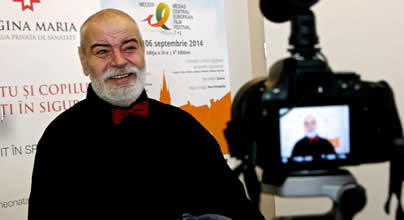
Cocias added that she was “very moved” to see people react so positively to her performances in the films. “Radu and I are happy every time we come to New York, because it feels so much like home for us.”
Gabrea himself is familiar with this period of history, having made the well-received 1992 feature “Rosenmil,” a love story set in the “Belle Epoche” era of pre-World War I Europe. The director shot the movie in the German town of Görlitz, which has since become notable as a shooting location due to the recent success of Wes Anderson’s Oscar-winning comedy “Grand Budapest Hotel,” which was also shot in that town.
Among the more than 20 major WWI-themed films that Gabrea hopes to screen at MECEFF 2015 are King Vidor’s “Big Parade” (1925), Lewis Milestone’s “All Quiet on the Western Front” (1930), Georg Pabst’s “Westfront 1918” (1930), Stanley Kubrick’s “Paths of Glory” (1957), “Charles Vidor’s “A Farewell to Arms” (1957), Joseph Losey’s “King and Country” (1964) and Dalton Trumbo’s “Johnny Got His Gun” (1971) from his novel of the same name.
Gabrea currently is in production of a feature-length documentary “The Red Princess,” about the life of Ana Pauker, the Romanian-born Jewish communist who would become the unofficial leader of Romania’s Commnist Party. In the late 1940s and early 1950s, she also became Romania’s first Jewish and first female foreign minister. Production on the film began in February, with the 100,000 euro budget fully financed by Romania’s National Film Center.
Directed by Gabrea with a screenplay by Gabrea and Magdalena Schubert, the film is based on the book “Ana Pauker:The Rise and Fall of a Jewish Communist” by Robert Levy, who is interviewed extensively in the film. Pauker was arrested in 1953 as an “agent of international Zionism” and was set to undergo an anti-Semitic show trial before it was cancelled due to Staliin’s death. By that time she had been purged from all her official positions, a victim of Soviet-imposed Stalinist policies, and died a disgraced pariah in 1960.
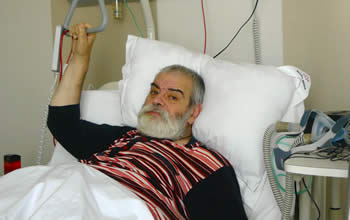 Last year, Gabrea, 77, was forced to coordinate the events of his 4-day MECEFF festival largely from a hospital room in Bucharest, where he was undergoing stomach surgery. Still, health issues appeared to have left him unfazed and undeterred; the director spent the last few minutes before his four-hour operation from his bedside telephoning MECEFF sponsors
Last year, Gabrea, 77, was forced to coordinate the events of his 4-day MECEFF festival largely from a hospital room in Bucharest, where he was undergoing stomach surgery. Still, health issues appeared to have left him unfazed and undeterred; the director spent the last few minutes before his four-hour operation from his bedside telephoning MECEFF sponsors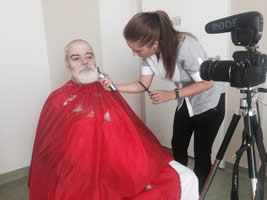 for money. He later filmed a short video for the opening ceremony from his hospital room and received, in absentia, a Romanian best director award. (His wife Victoria attended the ceremony.) But he surprised even his doctors by leaving Bucharest in the middle of his recovery and traveling 5-hours by car to Medias to be present at the festival’s closing ceremony. “You see, like a Rolls Royce, I am built to last,” he quipped.
for money. He later filmed a short video for the opening ceremony from his hospital room and received, in absentia, a Romanian best director award. (His wife Victoria attended the ceremony.) But he surprised even his doctors by leaving Bucharest in the middle of his recovery and traveling 5-hours by car to Medias to be present at the festival’s closing ceremony. “You see, like a Rolls Royce, I am built to last,” he quipped.
MECEFF’s competition section traditionally features one film submitted from each of seven Central European countries — Czech Republic, Austria, Hungary, Romania, Poland, Slovenia and Slovakia. There is also an additional “guest” country invited each year (hence the festival’s subtitle, “7+1”), which in 2014 was Spain. This year, a variety of countries will be invited to present major films that they have produced concerning World War I.
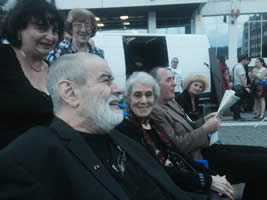
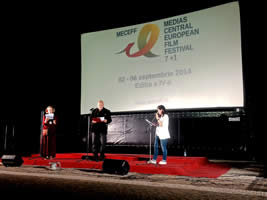 Gabrea is also making some strategic programming changes this year to accommodate the Great War emphasis.
Gabrea is also making some strategic programming changes this year to accommodate the Great War emphasis.
“This time we’ll have fewer movies, and longer discussions about those movies,” he said. “In the past festivals we’ve screened around 50 movies or so, which costs a lot of money in subtitling and preparations. But I think it’s more important that the public has a forum to meet and discuss and think about what they are seeing, and not for us just to cram in as many movies as possible.”
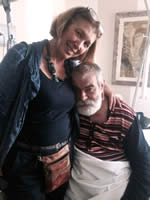
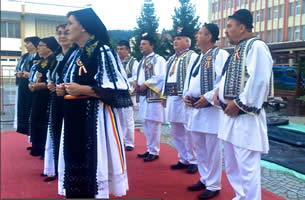 Last year’s festival celebrated the 25th anniversary of the fall of the Wall and of communism in Europe through seminars and film tributes to directors Andrzej Wajda, Milos Forman and Miklos Jancso. The festival’s top award, the MECEFF 2014 Trophy, went to the 4-hour political saga “Burning Bush,” set during the communist occupation of Czechoslovakia and directed by Poland’s Agnieszka Holland.
Last year’s festival celebrated the 25th anniversary of the fall of the Wall and of communism in Europe through seminars and film tributes to directors Andrzej Wajda, Milos Forman and Miklos Jancso. The festival’s top award, the MECEFF 2014 Trophy, went to the 4-hour political saga “Burning Bush,” set during the communist occupation of Czechoslovakia and directed by Poland’s Agnieszka Holland.
The festival handed its Audience Award to the Austrian film “Your Beauty is Worth Nothing” by Hüseyin Tabak, and gave its Best Cinematography honors to the Polish entry “Ida,” which is also nominated for a Best Foreign Film Oscar. Acting honors went to Luminița Gheorghiu for her work in the Romanian entry “Child’s Pose.”
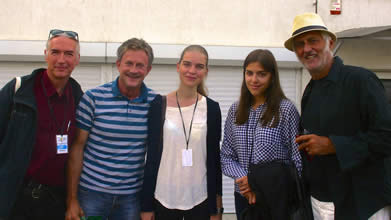 MECEFF’s 2014 jury was presided over by Anca Mitran, director of the Romania’s National Film Archive, and included Germany’s Bernd Desinger, the director of the Filmmuseum Düsseldorf; Italy’s Domenico (Mimmo) Mongelli, head of the Levante International Film Festival in Bari; Romanian film critic Calin Stanculescu; and CWB International Editor James Ulmer.
MECEFF’s 2014 jury was presided over by Anca Mitran, director of the Romania’s National Film Archive, and included Germany’s Bernd Desinger, the director of the Filmmuseum Düsseldorf; Italy’s Domenico (Mimmo) Mongelli, head of the Levante International Film Festival in Bari; Romanian film critic Calin Stanculescu; and CWB International Editor James Ulmer.

